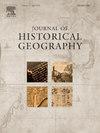Documentation, decentralisation, worldmaking: Amnesty International's Sierra Leone section, 1980s–1990s
IF 1.1
2区 历史学
Q2 GEOGRAPHY
引用次数: 0
Abstract
In this article I examine the process of using documentation to engage in institution building and (re)ordering. As such I contribute to understanding ways that actors built non-governmental institutions for worldmaking, the shaping of geopolitical relations. I also contribute to the project of writing a history of decentralisation, a key form of (re)ordering in the late twentieth century. The actors at the heart of this article are Amnesty International's Sierra Leonean section, who used documentation to interact with the rest of the organisation and develop and circulate a theory of the decentralised international organisation. They did this by documenting what was actually happening on the ground and circulating this information up to the organisational centre of Amnesty in an attempt to shape its policy. While using the case of Amnesty's Sierra Leone section, this article illuminates broader patterns in the organisation and its findings will be relevant to scholars interested in understanding how non-state actors engage in worldmaking via non-governmental organisations.
文件化,权力下放,世界塑造:大赦国际塞拉利昂分部,20世纪80 - 90年代
在本文中,我将研究使用文档参与制度建设和(重新)排序的过程。因此,我有助于理解行为者如何建立非政府机构来塑造世界,塑造地缘政治关系。我还参与了撰写去中心化历史的项目,去中心化是20世纪后期(重新)秩序的一种关键形式。本文的核心角色是国际特赦组织塞拉利昂分部,他们利用文件与组织的其他部门互动,并发展和传播分散化国际组织的理论。他们的做法是记录当地实际发生的情况,并将这些信息传递给大赦国际的组织中心,试图制定其政策。在使用国际特赦组织塞拉利昂部分的案例时,本文阐明了该组织更广泛的模式,其发现将与有兴趣了解非国家行为体如何通过非政府组织参与世界塑造的学者相关。
本文章由计算机程序翻译,如有差异,请以英文原文为准。
求助全文
约1分钟内获得全文
求助全文
来源期刊

Journal of Historical Geography
Multiple-
CiteScore
1.50
自引率
10.00%
发文量
53
期刊介绍:
A well-established international quarterly, the Journal of Historical Geography publishes articles on all aspects of historical geography and cognate fields, including environmental history. As well as publishing original research papers of interest to a wide international and interdisciplinary readership, the journal encourages lively discussion of methodological and conceptual issues and debates over new challenges facing researchers in the field. Each issue includes a substantial book review section.
 求助内容:
求助内容: 应助结果提醒方式:
应助结果提醒方式:


